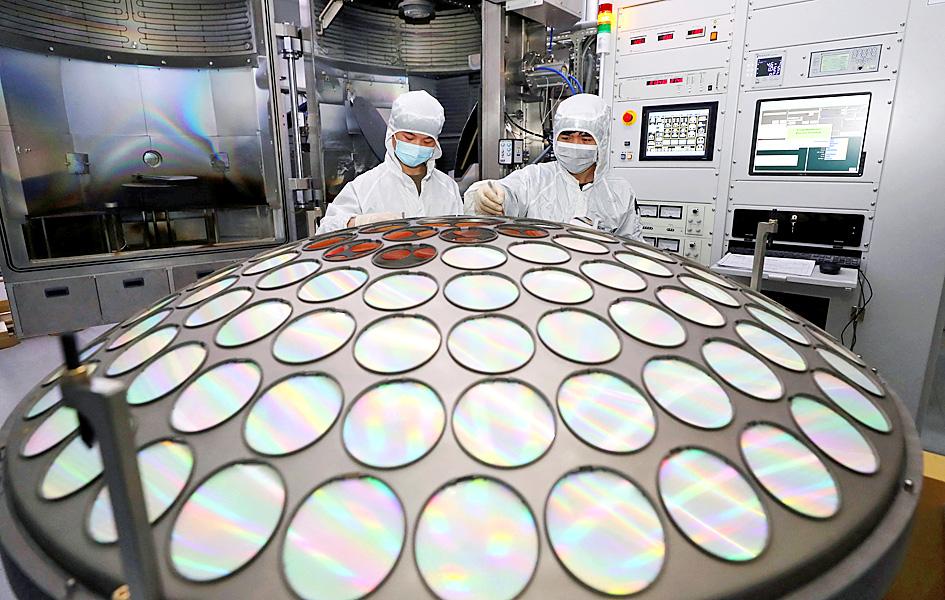Taiwan is to become the world’s largest spender on front-end chip manufacturing equipment this year, thanks to robust demand for chips used in vehicles and high-performance computing devices, international trade group SEMI said yesterday.
Fab equipment spending in Taiwan is forecast to rise 52 percent year-on-year to US$34 billion this year, ahead of South Korea’s US$25.5 billion, where it would be up 6 percent from the previous year, and US$17 billion in China, down 14 percent from its peak last year, SEMI said in its World Fab Forecast report.
Moreover, Europe and the Mideast combined would register record spending of US$9.3 billion this year, an annual surge of 176 percent, the report said.

Photo: Reuters
Overall, global fab equipment spending is expected to increase 20 percent this year to a record level of US$109 billion from US$91 billion last year, marking a third consecutive year of growth following a 42 percent surge last year, the report said.
Taiwan, South Korea and Southeast Asia are expected to register record investments this year, it added.
The global semiconductor equipment industry is on track to cross the US$100 billion threshold for the first time this year, SEMI said.
“This historic milestone puts an exclamation point on the current run of unprecedented industry growth,” SEMI president and chief executive officer Ajit Manocha said in a statement.
Total capacity in the global semiconductor industry is to expand by 8 percent this year after a 7 percent increase last year, and the growth is expected to continue next year with an annual growth of 6 percent, it said.
“The world semiconductor market was affected by changes in demand for end devices and inflation, causing a short-term inventory adjustment for chips used in certain electronic products, but, the industry is still on track to meet its long-term growth targets, benefiting from strong demand for automotive electronics and high-performance computing applications,” SEMI Taiwan president Terry Tsao (曹世綸) said in a statement.
The SEMI report showed that more than 85 percent of the spending on equipment this year would stem from capacity increases at 158 fabs and production lines.
The ratio is expected to be 83 percent next year after 129 fabs and production lines add capacity, it said.
The foundry sector is to account for the bulk of equipment spending this year and next year at about 53 percent, followed by the memory sector at 33 percent this year and 34 percent next year, the report said.
The forecast comes as major Taiwanese foundries are boosting capital spending this year to address a global chip shortage.
Taiwan Semiconductor Manufacturing Co (台積電) has budgeted record expenditure on equipment of US$40 billion to US$44 billion this year, including back-end equipment for chip testing and packaging services, while United Microelectronics Corp (聯電) has doubled its capital expenditure this year to US$3.6 billion from US$1.8 billion last year as it adds capacity at its fabs.

To many, Tatu City on the outskirts of Nairobi looks like a success. The first city entirely built by a private company to be operational in east Africa, with about 25,000 people living and working there, it accounts for about two-thirds of all foreign investment in Kenya. Its low-tax status has attracted more than 100 businesses including Heineken, coffee brand Dormans, and the biggest call-center and cold-chain transport firms in the region. However, to some local politicians, Tatu City has looked more like a target for extortion. A parade of governors have demanded land worth millions of dollars in exchange

Hong Kong authorities ramped up sales of the local dollar as the greenback’s slide threatened the foreign-exchange peg. The Hong Kong Monetary Authority (HKMA) sold a record HK$60.5 billion (US$7.8 billion) of the city’s currency, according to an alert sent on its Bloomberg page yesterday in Asia, after it tested the upper end of its trading band. That added to the HK$56.1 billion of sales versus the greenback since Friday. The rapid intervention signals efforts from the city’s authorities to limit the local currency’s moves within its HK$7.75 to HK$7.85 per US dollar trading band. Heavy sales of the local dollar by

Taiwan Semiconductor Manufacturing Co’s (TSMC, 台積電) revenue jumped 48 percent last month, underscoring how electronics firms scrambled to acquire essential components before global tariffs took effect. The main chipmaker for Apple Inc and Nvidia Corp reported monthly sales of NT$349.6 billion (US$11.6 billion). That compares with the average analysts’ estimate for a 38 percent rise in second-quarter revenue. US President Donald Trump’s trade war is prompting economists to retool GDP forecasts worldwide, casting doubt over the outlook for everything from iPhone demand to computing and datacenter construction. However, TSMC — a barometer for global tech spending given its central role in the

The Financial Supervisory Commission (FSC) yesterday met with some of the nation’s largest insurance companies as a skyrocketing New Taiwan dollar piles pressure on their hundreds of billions of dollars in US bond investments. The commission has asked some life insurance firms, among the biggest Asian holders of US debt, to discuss how the rapidly strengthening NT dollar has impacted their operations, people familiar with the matter said. The meeting took place as the NT dollar jumped as much as 5 percent yesterday, its biggest intraday gain in more than three decades. The local currency surged as exporters rushed to